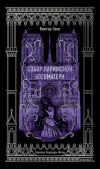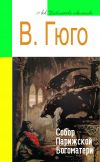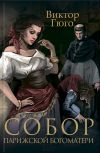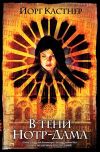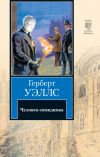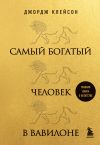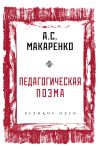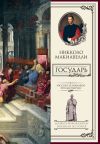Текст книги "Собор Парижской богоматери / Notre-Dame de Paris"

Автор книги: Виктор Гюго
Жанр: Иностранные языки, Наука и Образование
Возрастные ограничения: +12
сообщить о неприемлемом содержимом
Текущая страница: 3 (всего у книги 13 страниц) [доступный отрывок для чтения: 3 страниц]
A Bridal Night
A few moments later our poet found himself in a tiny arched chamber, very cosy, very warm, and alone with a pretty girl. The adventure smacked of enchantment.
The young girl did not appear to pay any attention to him. At last she came and seated herself near the table.
“So this,” he said to himself, “is la Esmeralda! a street dancer!”
He stepped up to the young girl. She drew back.
“What do you want of me?” said she.
“Can you ask me, adorable Esmeralda?” replied Gringoire.
The gypsy opened her great eyes. “I don’t know what you mean.”
“What!” resumed Gringoire; “am I not thine, sweet friend, art thou not mine?”
And, quite ingenuously, he clasped her waist.
The gypsy’s corsage slipped through his hands like the skin of an eel. She bounded from one end of the tiny room to the other. At the same time, the white goat placed itself in front of her, bristling with two pretty horns, gilded and very sharp.
The gypsy broke the silence on her side.
“You must be a very bold knave!”
“Pardon, mademoiselle,” said Gringoire, with a smile. “But why did you take me for your husband?”
“Should I have allowed you to be hanged?”
“So,” said the poet, somewhat disappointed in his amorous hopes. “You had no other idea in marrying me than to save me from the gibbet?”
“And what other idea did you suppose that I had?”
Gringoire bit his lips.
“Mademoiselle Esmeralda,” said the poet, “let us come to terms. I swear to you, upon my share of Paradise, not to approach you without your leave and permission, but do give me some supper.”
The gypsy did not reply. She drew up her head like a bird, then burst out laughing. A moment later, there stood upon the table a loaf of rye bread, a slice of bacon, some wrinkled apples and a jug of beer. Gringoire began to eat eagerly.
The young girl seated opposite him, watched him in silence, visibly preoccupied with another thought, at which she smiled from time to time, while her soft hand caressed the intelligent head of the goat, gently pressed between her knees.
“You do not eat, Mademoiselle Esmeralda?”
She replied by a negative sign of the head.
The young girl’s mind was elsewhere, and Gringoire’s voice had not the power to recall it. Fortunately, the goat interfered. She began to pull her mistress gently by the sleeve.
“What dost thou want, Djali?” said the gypsy.
“She is hungry,” said Gringoire, charmed to enter into conversation. Esmeralda began to crumble some bread, which Djali ate gracefully from the hollow of her hand.
Moreover, Gringoire did not give her time to resume her revery.
“So you don’t want me for your husband?”
The young girl looked at him intently, and said, “No.”
“For your lover?” went on Gringoire.
She pouted, and replied, “No.”
“For your friend?” pursued Gringoire.
She gazed fixedly at him again, and said, after a momentary reflection, “Perhaps.”
This “perhaps” emboldened Gringoire.
“Do you know what friendship is?” he asked.
“Yes,” replied the gypsy; “it is to be brother and sister; two souls which touch without mingling, two fingers on one hand.”
“And love?” pursued Gringoire.
“Oh! love!” said she, and her voice trembled, and her eye beamed. “That is to be two and to be but one.”
Gringoire continued,—
“What must one be then, in order to please you?”
“A man.”
“And I—” said he, “what, then, am I?”
“A man has a helmet on his head, a sword in his hand, and golden spurs on his heels.”
“Good,” said Gringoire, “without a horse, no man. Do you love any one?”
“As a lover?—”
“Yes.”
She remained thoughtful for a moment, then said with a peculiar expression: “That I shall know soon.”
“Why not this evening?” resumed the poet tenderly. “Why not me?”
She cast a grave glance upon him and said,—
“I can never love a man who cannot protect me.”
Gringoire colored, and took the hint. It was evident that the young girl was alluding to the slight assistance which he had rendered her in the critical situation in which she had found herself two hours previously.
“How did you contrive to escape from the claws of Quasimodo?”
This question made the gypsy shudder.
“Oh! the horrible hunchback,” said she, hiding her face in her hands.
“Horrible, in truth,” said Gringoire, who clung to his idea; “but how did you manage to escape him?”
La Esmeralda smiled, sighed, and remained silent.
“Do you know why he followed you?” began Gringoire again.
“I don’t know,” said the young girl, and she added hastily, “but you were following me also, why were you following me?”
“In good faith,” responded Gringoire, “I don’t know either.”
The gypsy began to caress Djali.
“That’s a pretty animal of yours,” said Gringoire.
“She is my sister,” she answered.
“What is the meaning of the words, la Esmeralda?”
“I don’t know,” said she.
“To what language do they belong?”
“They are Egyptian, I think.”
“I suspected as much,” said Gringoire, “you are not a native of France?”
“I don’t know.”
“At what age did you come to France?”
“When I was very young.”
“And when to Paris?”
“Last year.”
She made her customary pretty grimace. “I don’t even know your name.”
“My name? If you want it, here it is,—Pierre Gringoire.”
“I know a prettier one,” said she.
“Naughty girl!” retorted the poet. “Never mind, you shall not provoke me.”
Girl’s eyes were fixed on the ground.
“Phoebus,” she said in a low voice. Then, turning towards the poet, “Phoebus,—what does that mean?”
“It is a Latin word which means sun.”
“Sun!” she repeated.
“It is the name of a handsome archer, who was a god,” added Gringoire.
“A god!” repeated the gypsy, and there was something pensive and passionate in her tone.
At that moment, one of her bracelets became unfastened and fell. Gringoire stooped quickly to pick it up; when he straightened up, the young girl and the goat had disappeared. He heard the sound of a door bolt.
“Has she left me a bed, at least?” said our philosopher.
He made the tour of his cell. There was no piece of furniture adapted to sleeping purposes, except a tolerably long wooden coffer.
Book Third
Chapter IGood Souls
Sixteen years previous to when this story takes place, one fine morning, on Quasimodo Sunday, a living creature had been deposited, after mass, in the church of Notre-Dame, on the wooden bed securely fixed in the vestibule on the left.
That appeared to excite the curiosity of the numerous group which had congregated about the wooden bed. The group was formed for the most part of women.
In the first row, and among those who were most bent over the bed, four were noticeable, who, from their clothes, were recognizable as attached to some devout sisterhood. They were Agnès la Herme, Jehanne de la Tarme, Henriette la Gaultière, Gauchère la Violette, all four widows, all four dames of the Chapel Étienne Haudry.
“What is this, sister?” said Agnès to Gauchère, gazing at the little creature.
“What is to become of us,” said Jehanne, “if that is the way children are made now?”
“’Tis not a child, Agnès.”
“’Tis an abortion of a monkey,” remarked Gauchère.
“’Tis a miracle,” interposed Henriette la Gaultière.
“He yells loud enough to deafen a chanter,” continued Gauchère.
“I imagine,” said Agnès la Herme, “that it is a beast, an animal,—something not Christian, in short, which ought to be thrown into the fire or into the water.”
It was, in fact, not a new-born child. It was a very angular and very lively little mass. Its head was deformed enough; one beheld only a forest of red hair, one eye, a mouth, and teeth. The eye wept, the mouth cried, and the teeth seemed to ask only to be allowed to bite.
Many people stopped to see the child. Among them was a young priest. He had been listening for everyone who stopped for a while. He had a severe face, with a large brow, and a profound glance. Eventually, he thrust the crowd silently aside, and proclaimed that he would be the one to adopt the child.
He took it in his cassock and carried it off. The spectators followed him with frightened glances. A moment later, he had disappeared through the door, which led from the church to the cloister.
When the first surprise was over, one of the spectators bent down to the ear of another,—
“I told you so, sister,—that young clerk, Monsieur Claude Frollo, is a sorcerer.”
Chapter IIClaude Frollo
In fact, Claude Frollo was no common person.
He belonged to one of those middle-class families which were called the high bourgeoise or the petty nobility.
He had been destined from infancy, by his parents, to the ecclesiastical profession. He had been taught to read in Latin; he had been trained to keep his eyes on the ground and to speak low. While still a child, his father had cloistered him in the college of Torchi in the University.
Frollo was a sad, grave, serious child, who studied ardently, and learned quickly. Thus, at sixteen years of age, he might have held his own against a father of the church in mystical theology; in canonical theology, against a father of the councils; in scholastic theology, against a doctor of Sorbonne.
Theology conquered, he had plunged into decretals. Then he flung himself upon medicine, on the liberal arts. At the age of eighteen, he had made his way through the four faculties; it seemed to the young man that life had but one sole object: learning.
The excessive heat of the summer of 1466 caused that grand outburst of the plague which carried off more than forty thousand souls in Paris. The rumor spread in the University that the Rue Tirechappe was especially devastated by it. It was there that Claude’s parents resided. The young scholar rushed in great alarm to the paternal mansion. When he entered it, he found that both father and mother had died on the preceding day. A very young brother of his, was still alive and crying abandoned in his cradle. This was all that remained to Claude of his family. Up to that moment, he had lived only in science; he now began to live in life.
This catastrophe was a crisis in Claude’s existence. Orphaned, the eldest, head of the family at the age of nineteen, he felt himself rudely recalled from school to the realities of this world. Then, moved with pity, he was seized with passion and devotion towards the child, his brother.
This young brother, without mother or father, this little child which had fallen abruptly from heaven into his arms, made a new man of him. He threw himself into the love for his little Jehan with the passion of a character already profound, ardent, concentrated; that poor frail creature, pretty, fair-haired, rosy, and curly, touched him to the bottom of his heart. He was more than a brother to the child; he became a mother to him.
Little Jehan had lost his mother while he was still at the breast; Claude gave him to a nurse. There was a miller’s wife there who was nursing a fine child; it was not far from the university, and Claude carried the little Jehan to her in his own arms.
From that time forth, feeling that he had a burden to bear, he took life very seriously. The thought of his little brother became not only his recreation, but the object of his studies. He resolved to consecrate himself entirely to a future for which he was responsible in the sight of God, and never to have any other wife, any other child than the happiness and fortune of his brother. At the age of twenty, he was a priest, and served as the youngest of the chaplains of Notre-Dame.
This mixture of learning and austerity, so rare at his age, had promptly acquired for him the respect and admiration of the monastery.
It was at the moment when he was returning, on Quasimodo day, from saying his mass at the Altar of the Lazy, that his attention had been attracted by the group of old women chattering around the bed for foundlings.
Then it was that he approached the unhappy little creature, which was so hated and so menaced. That distress, that deformity, that abandonment, the thought of his young brother, the idea which suddenly occurred to him, that if he were to die, his dear little Jehan might also be flung miserably on the plank for foundlings,—all this had gone to his heart simultaneously; a great pity had moved in him, and he had carried off the child.
When he removed the child from the sack, he found it greatly deformed. The poor little wretch had a wart on his left eye, his head placed directly on his shoulders, his spinal column was crooked, his breast bone prominent, and his legs bowed; but he appeared to be lively; and although it was impossible to say in what language he lisped, his cry indicated considerable force and health. Claude’s compassion increased at the sight of this ugliness; and he made a vow in his heart to rear the child for the love of his brother.
He baptized his adopted child, and gave him the name of Quasimodo.
Chapter IIIImmanis Pecoris Custos, Immanior Ipse
Now, in 1482, Quasimodo had grown up. He had become a few years previously the bellringer of Notre-Dame.
In the course of time there had been formed a certain bond which united the ringer to the church. Separated forever from the world, he grown used to seeing nothing in this world beyond these walls. Notre-Dame had been to him successively, as he grew up and developed, the egg, the nest, the house, the country, the universe.
Little by little, developing along with the cathedral, living there, sleeping there, hardly ever leaving it, he became an integral part of it. The rough and wrinkled cathedral was his shell.
He often climbed many stones up the front, aided solely by the uneven points of the carving. The towers, on whose exterior surface he was frequently seen clambering, possessed for him neither vertigo, nor terror. To see them so gentle under his hand, so easy to scale, was to tame them.
It was not his body alone which seemed fashioned after the Cathedral, but his mind also. Quasimodo had been born one-eyed, hunchbacked, lame. It was with great difficulty that Claude Frollo had succeeded in teaching him to talk. But, at the age of fourteen, the bells had broken the drums of his ears and Quasimodo had become deaf. The only gate which nature had left wide open for him had been abruptly closed, and forever.
It had cut off the only joy he had. His soul fell into profound night. The very moment that he found himself to be deaf, he resolved upon a silence which he only broke when he was alone.
He had trouble seeing, recieving hardly any immediate perception of things. The external world seemed much farther away to him than it does to us. He was malicious as well. That was because he was savage; and he was savage because he was ugly.
His strength, so extraordinarily developed, was a cause of still greater malevolence.
Malevolence was not, perhaps, innate in him. From his very first steps among men, he had felt himself, later on he had seen himself, spewed out, blasted, rejected. As he grew up, he had found nothing but hatred around him. And he had picked up the weapon with which he had been wounded.
After all, he turned his face towards men only with reluctance; his cathedral was sufficient for him. It was peopled with marble figures,—kings, saints, bishops,—who at least did not burst out laughing in his face, and who gazed upon him only with tranquillity and kindliness.
What he loved above all else were the bells. He loved them, talked to them, understood them. From the chime in the spire, over the intersection of the aisles and nave, to the great bell of the front, he cherished a tenderness for them all. The central spire and the two towers were to him as three great cages, whose birds, reared by himself, sang for him alone.
The cathedral indeed seemed a docile and obedient creature beneath his hand; it waited on his will to raise its great voice; it was possessed and filled with Quasimodo, as with a familiar spirit. He was everywhere about it; in fact, he multiplied himself on all points of the structure. Now one perceived at the very top of one of the towers, a fantastic dwarf climbing, writhing, crawling on all fours, descending outside above the abyss, leaping from projection to projection; it was Quasimodo dislodging the crows. Again, in some obscure corner of the church one came in contact with a sort of living chimera, crouching and scowling; it was Quasimodo engaged in thought. Sometimes one caught sight, upon a bell tower, of an enormous head and a bundle of disordered limbs swinging furiously at the end of a rope; it was Quasimodo ringing the bells.
For those who know that Quasimodo has existed, Notre-Dame is today deserted, inanimate, dead. One feels that something has disappeared from it. That immense body is empty; it is a skeleton; it is like a skull which still has holes for the eyes, but no longer sight.
Chapter IVThe Dog and his Master
Nevertheless, there was one human creature whom Quasimodo loved even more, perhaps, than his cathedral: this was Claude Frollo.
The matter was simple; Claude Frollo had taken him in, had adopted him, had nourished him. Quasimodo’s gratitude was profound, passionate; and although the visage of his adopted father was often clouded, that gratitude never wavered for a single moment. The archdeacon had in Quasimodo the most submissive slave, the most docile lackey, the most vigilant of dogs. The archdeacon was the sole human being with whom Quasimodo had preserved communication.
There is nothing which can be compared with the effect of the archdeacon over the bellringer. A sign from Claude would have sufficed to make Quasimodo hurl himself from the summit of Notre-Dame. It was gratitude, so pushed to the limit, that we do not know to what to compare it with.
Chapter VMore about Claude Frollo
In 1482, Quasimodo was about twenty years of age; Claude Frollo, about thirty-six. One had grown up, the other had grown old.
Claude Frollo was no longer the simple scholar of the college of Torchi. He was a priest, austere, morose. He had never abandoned neither science nor the education of his young brother, but as time went on, some bitterness had been mingled with these things which were so sweet. Little Jehan Frollo, had not grown up in the direction which Claude would have liked him to. He was a regular devil, and a very disorderly one, who made Dom Claude scowl; but very droll and very subtle, which made the big brother smile.
Claude had confided him to that same college of Torchi where he had passed his early years in study and meditation. He sometimes preached Jehan very long and severe sermons, which the latter intrepidly endured. After all, the young scapegrace had a good heart. But, when the sermon was over, he nonetheless tranquilly resumed his course of debauchery.
Claude, saddened and discouraged by all this, had flung himself eagerly into the arms of learning. He became more and more rigid as a priest, more and more sad as a man. He had penetrated further, lower; he had, perhaps, risked his soul, and had seated himself in the cavern at that mysterious table of the alchemists, of the astrologers, of the hermetics, of which Averroès, Guillaume de Paris, and Nicolas Flamel hold the end in the Middle Ages.
That is, at least, what was supposed, whether rightly or not. It is certain that the archdeacon often visited the cemetery of the Saints-Innocents, where, it is true, his father and mother had been buried; but that he appeared far less devout before the cross of their grave than before the strange figures with which the tomb of Nicolas Flamel and Claude Pernelle.
It is certain that he had frequently been seen to enter a little house which Nicolas Flamel had built, where he had died about 1417, and which, constantly deserted since that time, had already begun to fall in ruins. Some neighbors even affirm that they had once seen, through an air-hole, Archdeacon Claude excavating, turning over, digging up the earth in the two cellars. It was supposed that Flamel had buried the philosopher’s stone in the cellar.
Furthermore, it is certain that the archdeacon had established himself in that one of the two towers of Notre-Dame, just beside the frame for the bells, a very secret little cell, into which no one, not even the bishop, entered without his leave, it was said. What that cell contained, no one knew; but at night, there was often seen to appear, disappear, and reappear, a certain red light coming from the small window.
There were no great proofs of sorcery in that, after all, but there was still enough smoke to warrant a surmise of fire.
More than once a choir-boy had fled in terror at finding Frollo alone in the church, so strange and dazzling was his look. More than once, in the choir, at the hour of the offices, his neighbor in the stalls had heard him mingle with the plain song unintelligible parentheses.
However, he had never been more exemplary. By profession as well as by character, he had always held himself aloof from women; he seemed to hate them more than ever. It was also noticed that his horror for Bohemian women and gypsies had seemed to redouble for some time past. He had petitioned the bishop to forbade the Bohemian women to come and dance and beat their tambourines; and for about the same length of time, he had been collecting the cases of sorcerers and witches condemned to fire or the rope.
Внимание! Это не конец книги.
Если начало книги вам понравилось, то полную версию можно приобрести у нашего партнёра - распространителя легального контента. Поддержите автора!